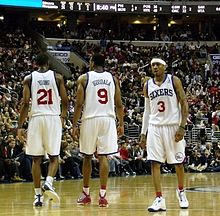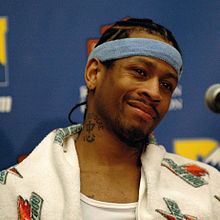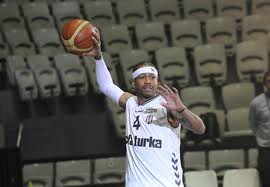 PHILADELPHIA —News that Allen Iverson is finally out of “answers’’ and will soon officially announce his retirement to start his Hall of Fame induction clock running brings a flood of thoughts and memories to mind.
PHILADELPHIA —News that Allen Iverson is finally out of “answers’’ and will soon officially announce his retirement to start his Hall of Fame induction clock running brings a flood of thoughts and memories to mind.
After all, when you cover a guy for more than a decade, observing his NBA career from the start … when you watch him evolve from a pure gunner with no concept of team play to a legitimate MVP recipient on a team that goes to the NBA Finals … and when you witness his skills and legend grow even greater before ultimately beginning to erode and come crashing down … you can’t help but remember what a phenomenon the whole experience was.
And trust me, Allen Iverson was a phenomenon, a 6-foot tall blur with a fearless—or was it reckless?—style that captivated the league and especially the fans. The way he’d relentlessly go to the hoop—taking a nightly pounding from defenders twice his size who’d knock him to the floor only to see him bounce right up and come back from more—was mesmerizing. To watch and chronicle “The Answer’’ at his finest, which included an eight-year stretch in which he averaged between 26.8 and 33.0 points a game, was such fun it hardly seemed like a job.
But once it began to go wrong, things quickly unraveled. Unofficially, A.I’s time ended three full years ago when his celebrated return — a painful to watch 25-game ordeal with a Sixers team headed nowhere — expired with him on the sidelines said to be caring for his ailing daughter. As noble a sacrifice as that might sound, the reality is if Iverson truly had been needed and/or if he could’ve made a difference, they would’ve figured out a way to keep him in uniform.
 Instead, the “little kid’’ as Larry Brown, the coach who helped make him the player he was, affectionately called him, slinked out the NBA door after that season, never to return. Were there opportunities for him to come back, undoubtedly in a lesser role than being the star of the show? Probably.
Instead, the “little kid’’ as Larry Brown, the coach who helped make him the player he was, affectionately called him, slinked out the NBA door after that season, never to return. Were there opportunities for him to come back, undoubtedly in a lesser role than being the star of the show? Probably.
But Allen Iverson’s hubris simply wouldn’t allow it. If he couldn’t be the featured act, he just wasn’t interested. That’s what led to his departure from Memphis—his second stop after the Sixers sent him packing to Denver in December, 2006. After a year-and-a-half with the Nuggets, followed by an uneventful season in Detroit, it should’ve been obvious he needed to make changes in his game.
He either couldn’t—or more likely, wouldn’t—do it.
Thinking back, one Iverson moment strikes me as most telling of his mindset. No, it wasn’t the famous “We’re talking about practice!’’ press conference where A.I. wondered why such a fuss was being made about his reluctance to practice to improve not only his game but his cohesion with teammates. If you’ve never seen it, click the play button and enjoy.
Or the one where he tried to justify his thinking about the impending release of a Rap CD which promoted violence and anti-gay sentiments. The outcry over that CD and negative publicity reached such a boiling point Iverson tabled the whole thing.
This particular incident relates to a story that appeared in a Charlotte paper in the midst of the Sixers’ 2000 playoff series with the Hornets. Iverson objected to some comments made by Philadelphia general manager Billy King, saying he felt disrespected. He said he felt King was treating him like he was the 12th man on the team rather than the franchise player.
How dare he!
The most troubling aspect to Iverson’s reaction wasn’t his exalted opinion of himself. We were used to that by then. It was his complete disdain for a teammate, as if being 12th man on am NBA team —- or as was proven in later years, anyone who came off the bench — was some kind of mark of shame.
When I asked Sixers’ rookie Ira Bowman — Philadelphia’s 12th man — what his NBA life was like, he had no complaints. He realized just being on an NBA roster was an achievement, certainly nothing to be embarrassed about.
 Allen Iverson never got that.
Allen Iverson never got that.
In his mind his teammates were merely along to be part of his entourage. They were there to enhance his glory, not to steal it.
So he could never compensate when his skills began to fade. He refused to consider the possibility of adapting his game, becoming a role player — perish the thought. Not only might that have made him more attractive to prospective teams —imagine Iverson coming off the bench firing and creating instant offense with his ability to drive and kick — it likely would’ve prolonged his career.
Who knows how long he could’ve lasted had he kept himself in shape and stayed out of harm’s way? Rather than continuing to take the pounding that ultimately took its toll, a re-tooled Iverson could’ve stayed in one piece, riddling defenses from the perimeter, yet still capable of darting inside to wreak havoc when they least expected it.
Ah, what might’ve been.
Then again, the nature of Allen Iverson was breaking the norm.
Being conventional was never his thing. His credo “Play every game like my last’’ was a testament to where he’d come from. The kid who was also star high school quarterback who wound up imprisoned following an incident at a Hampton Roads, Va., bowling alley, left jail with a chip on his shoulder that only grew through the years.
Coupled with his “me against the world’’ mentality, Iverson allowed his cronies from the ‘hood to pretty much do as they pleased, often at his expense. They “expressed’’ their gratitude for him buying them lavish cars and letting them live like kings by getting him indirectly involved in assorted legal matters involving drugs and guns. Iverson further soiled his own reputation with a celebrated domestic dispute with his wife that had reporters camped out at his house for days.
But as long as A.I. could knock down a 20-footer, or swoop to the hoop with one of his patented high-off-the-glass layups, then cup his ear to hear the roars of the crowd, all was fine in his world. Once the cheering stopped, once the shots curled off the rim and players of lesser skills began to take him to school, he never knew how to deal with it.
 It’s been three years since Iverson’s Philadelphia Story Part II ended.
It’s been three years since Iverson’s Philadelphia Story Part II ended.
That includes a brief stint in Turkey where he must’ve hoped to discover some kind of Modern Day Fountain of Youth that would show all those cynics he belonged back in the NBA.
Finally after three years banging on NBA doors, only to find them shut, he’s gotten the message.
It’s time for the Answer to stop asking if they’ll take him back.
Time for him to get on with the rest of his life, which knowing his mindset he probably figured would be just about over by now. Chances are Allen Iverson never planned for a future, because he didn’t think there would be one. Not only did he play every game like his last, he lived his life that way.
In a couple of years the Hall of Fame will come calling — and it should for an 11-time all-star, four-time scoring champ with more than 24,000 points, 24th best in NBA history. His 26.7 career scoring average puts him No. 6 on the all-time list. Whatever else you say or think about him, those numbers are surely Hall of Fame worthy.
The legacy of Allen Iverson, then, will be one of a superstar who did so much, yet could’ve done more. There’s an MVP and all those scoring titles, but no championships to show for his efforts. Yes, Charles Barkley, Patrick Ewing, John Stockton and Karl Malone—among many others—can relate. All came close but never could quite get over the hump.
The difference is they maximized their efforts, did everything within their power to reach for the brass ring, only to come up short against superior opposition. Can Allen Iverson, who never met a shot he didn’t like and never really played defense, other than gambling for steals that would invariably result in easy baskets at the other end when his gamble backfired, truly say the same?
Sometime this week he’s expected to make it official.
He’ll concede that the basketball world won’t have Allen Iverson to kick around anymore. On that day I’ll remember both the good and bad about a player who for more than a decade made every day going to work an adventure. since I never knew what to expect.
You can’t say that very often, no matter what you do.
So see you in Springfield in a couple of years, A.I.
Just one crazy suggestion you might consider before getting up to deliver your acceptance speech.
Practice it.
Jon Marks has covered the Philadelphia 76ers from the days of Dr. J and his teammate, Joe Bryant (best known as Kobe’s dad). He has won awards from the Pro Basketball Writer’s Association and North Jersey Press Club. His other claim to fame is driving Rick Mahorn to a playoff game after missing the team bus. Follow him on Twitter.